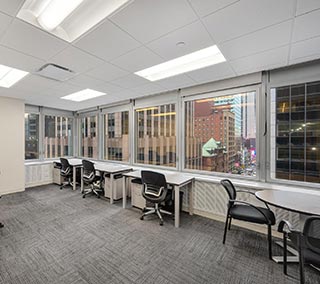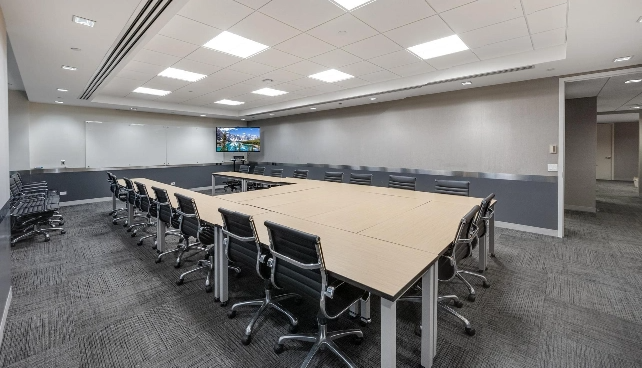A virtual office is a good alternative to a traditional office in NYC if you need a professional presence without the overhead of physical office space.
Starting your own business in New York City is easier than ever thanks to the Internet, but startups in NYC often run into challenges when trying to decide between a virtual office or a traditional physical office. Although a traditional office provides some benefits, many startups have found that virtual offices are the way to go.
Below are some considerations if you’re trying to decide between a virtual office vs. a traditional office in NYC:
What is a Virtual Office in NYC?
A virtual office provides business owners the opportunity to have a physical business address without the need to actually occupy a physical office. Virtual office spaces are often a good choice for businesses that employ a number of remote employees or that work with remote contractors.
Below are some additional features you can expect to find from a virtual office company:
- Services to answer phone calls and accept mail
- On-demand access to in-office meeting space
- High-speed Internet and networking solutions
- Professional presence in different locations around the world
Virtual office companies differ in what features and amenities they provide. If you’re in NYC and are considering a virtual office vs. a traditional physical office, think about the features your company and workers require in order to find the right virtual office partner.
What is a Traditional Office Space in NYC?
Traditional office space provides a physical environment where all or most of your company’s employees complete the work they perform for your business. A traditional office has a physical address and may have dedicated physical spaces for individual offices and departments within an office building or complex.
Below are some of the features you can expect to find in traditional office space:
- A physical space where work can be completed
- Lighting and climate control systems
- Wiring for networking equipment and access to Internet and phone networks
- Mail acceptance services
- Office furniture and meeting spaces
What Are the Advantage of Virtual Offices in NYC?
Although traditional office spaces have been used by business owners since at least the 18th Century, the Internet has changed the concept of what defines an office. These days, virtual office solutions offer many of the same things found in traditional offices without the disadvantages that come along with showing up to a physical address each workday.
Below are several advantages business owners can expect from using virtual offices:
A Virtual Office Offers Cost Savings
Virtual office space is often less expensive compared to traditional office space leasing. Without the need for physical office space or overhead costs, virtual offices are usually a lot less expensive while still providing plenty of benefits.
Virtual Offices Provide Flexibility
When you lease a traditional office space, you lose a lot of flexibility to change plans at a moment’s notice. Virtual offices, on the other hand, offer a lot of flexibility, and this is good news for startups and small companies that need room to grow and evolve. If you need to add employees or change your organizational structure, virtual offices can accommodate these changes while a traditional office arrangement may require more work and money to do the same.
Virtual Offices Give a Professional Presence
Startups and small businesses in NYC often find it unnerving to sign long-term leases for traditional office space simply due to the uncertain nature of getting a business off the ground. A virtual office usually requires shorter contracts compared to traditional office space lease agreements. In fact, many virtual office agreements run month-to-month.
Additional Features of a Virtual Office
Some additional features you may get out of a virtual office include:
- Administrative services
- Ability to use cloud networks
- Physical meeting space when you need it
- Potential to be included in a virtual office online directory
What Are the Disadvantages of Virtual Offices in NYC?
While a virtual office in NYC can be ideal for startups and small businesses in a range of industries, these solutions aren’t right for everyone. Below are some drawbacks of choosing a virtual office vs. a traditional office in NYC:
Virtual Offices Lack Physical Space
One of the biggest benefits of a virtual office can actually be one of its biggest drawbacks: Lack of physical office space. Although many virtual office services allow business owners to utilize physical meeting rooms on demand, you may find it challenging to get space when you need it if that space has already been booked by someone else. This can cause you to delay important meetings and push back deadlines.
Virtual Offices Place Limitations on Remote Workers
Because a virtual office doesn’t provide physical office space on a daily basis like a traditional office, all or most of your workers must be remote. This type of arrangement works well for some types of businesses in NYC, but others may find that they need more in-office access for employees as a business grows.
There is No Long-Term Commitment With a Virtual Office
Signing a lease with a traditional office real estate company means that you can expect to receive the services and amenities outlined in your lease agreement for the term of your lease. With a virtual office, you will still sign an agreement, but there is usually less commitment involved, both on your part and the part of the virtual office company. Because of this, some business owners may shy away from virtual office arrangements in order to gain more stability.
Virtual Offices Only Offer Limited Access to Clients and Meetings
Meeting with clients in a dedicated office space is crucial for conducting business in NYC and elsewhere. While many virtual office companies offer access to meeting rooms as long as access is scheduled in advance, these spaces may not always be able to accommodate your specific needs. As a result, you may find that you have to juggle arrangements with clients or leads that can adversely affect your business relationships.
What Are the Advantages of Traditional Office Spaces in NYC?
Traditional office space has been utilized by companies for hundreds of years because this arrangement provides a number of benefits. Below are some of the advantages of choosing traditional office space vs. a virtual office in NYC:
A Traditional Office is a Stable Environment for Employees
Although studies vary on the effectiveness of remote work compared to in-office roles, a traditional office space can provide a certain level of stability for employees that can be challenging to match using a virtual office.
A Traditional Office is a Private and Dedicated Workspace for Business Owners
Working in a traditional office can be an advantage for business owners working on private or proprietary projects. In a virtual office setup, the same level of security and privacy may not be present due to shared digital workspaces and the potential for stored data to be accessed by individuals without authorization.
What Are the Disadvantages of Traditional Office Spaces in NYC?
Of course, despite the benefits of traditional office space, there are plenty of negatives that can make such an arrangement a poor fit for startups in NYC and elsewhere. Below are some of the biggest drawbacks of utilizing a traditional office space:
Traditional Offices Have Higher Costs
Overhead expenses in an office, including utilities and even paper for the copy machine, can add up quickly and eat into profits. When you combine these costs with the price you pay to lease office space in NYC, an in-office arrangement may put a strain on a startup’s finances.
Traditional Offices Often Require Long-Term Commitments
Signing a lease for a traditional office can mean committing to occupy and pay for the space for a long time. Even short leases may require a minimum of a year-long commitment, but many office space brokers will not consider tenants for less than a three-year lease.
Traditional Offices Offer Limited Scalability
A traditional office may also make it difficult to scale your operations as your business grows. Because a traditional office is limited in its physical capacity, you may find your plans for growth stifled by a long-term lease in a traditional office space.
Traditional Offices Place Geographic Constraints on Business Owners
If you rely on a traditional office as your workplace, your business may be limited when it comes to sourcing talent. Even if you own your business in a talent-rich environment, you will still want to keep your options open to find the best people possible for the roles you need to fill. Sourcing talent locally can limit your options to find these people while sourcing talent remotely through a virtual office opens more opportunities.
Traditional Offices Comes With Commuting Challenges
Commuting to and from a workplace is often cited as a huge negative aspect of working in a traditional office. When employee attendance is required at a traditional office, you may find that your employees are less productive simply because they dread commuting each day.
Traditional Offices Often Suffer From a Lack of Collaboration Opportunities
You might think that a traditional office would make it easier to collaborate since everyone is in the same building, but traditional office layouts can actually make it more challenging to collaborate. When employees spend all their time chasing down colleagues in a large office environment to try to collaborate, productivity gets wasted.
Traditional Offices Usually Come With Increased Distractions
In-office distractions can play a large role in hurting productivity. Everything from chatting and music to gum-smacking and sneezing can throw off concentration and cause workers to be less productive.
There is Often a Maintenance Responsibility With Traditional Offices
Many traditional office lease agreements require business owners to pay for certain maintenance costs like cleaning. These costs can add up over time and may put a dent in your company’s bottom line.
Traditional Offices Offer a Limited Work-Life Balance
Working in a traditional office can also upset the work-life balance of employees. Just the commute alone can eat away at workers’ free time, but having to stay a few minutes late or show up a few minutes early for projects can add up. Additionally, many workers find they only have time to grab a quick bite during a lunch break when working in an office, meaning this supposed free time can only be used for a quick unhealthy meal.
Traditional Offices Have a Higher Environmental Impact
Depending on your industry, a traditional office can also negatively impact the environment. Between the commute, office supplies, energy used in an office, including unused parts or offices that are closed, and more, all of these factors can increase a company’s carbon footprint.
Is a Traditional Office or a Virtual Office Better for Your Specific Business?
Determining which type of office space solution is right for your specific business comes down to your current needs and your goals. If you’re looking for flexibility and the ability to take advantage of new technologies quickly, virtual office solutions are the way to go. If you prefer to fight traffic on your commute to sit in an office all day, then a traditional office may work better for your needs.
Frequently Asked Questions
Below are some frequently asked questions about how virtual office solutions compare to traditional office options:
What is the difference between a virtual office and a traditional office?
A virtual office is a physical address where certain traditional office functions can be completed without actually leasing office space. A traditional office is a physical building where workers gather each day to complete tasks for a company.
Why is a virtual office better than a physical office?
A virtual office is better than a traditional physical office because a virtual office can save on costs, allow employees to work remotely, reduce energy usage and provide many of the same functions of a traditional office in a streamlined fashion.
How much does a virtual office cost in NYC?
The cost of a virtual office in NYC varies. Some virtual office solutions add costs based on the number of employees a business adds to a virtual office while others determine costs on a month-to-month basis. Some estimates place the cost of a virtual office in NYC at between $50-$100 per month with costs rising as amenities and features are added to plans.
What is the difference between a coworking space and a virtual office?
Coworking spaces are another option for business owners seeking alternative workspaces. A coworking space is a physical office space that is shared by two or more businesses. A virtual office does not include daily access to physical office space but provides many of the same features found in a traditional office environment.
What are the disadvantages of a virtual office?
Although a virtual office provides a number of advantages, there are some disadvantages to using a virtual office. The lack of physical office space can make it challenging to gather employees together for projects in person, and the lack of shared equipment among employees can mean your business needs to look into additional cloud-based networking in order to bring all of your projects together in a virtual office setup.
What is the difference between a mobile office and a virtual office?
A mobile office and a virtual office are both office arrangements that forgo the traditional office space; however, a mobile office tends to rely exclusively on cloud-based technologies that can be accessed remotely on the go. A virtual office has a physical office address where mail can be sent, whereas a mobile office typically does not include a physical presence at all.
Is a virtual office legal in USA?
Virtual offices are legal in the United States, but you are encouraged to consult with your attorney to ensure that your specific business is able to take advantage of a virtual office. Some industries, including financial, legal and healthcare, may have regulations and restrictions that govern where and how sensitive data must be handled and archived.
How much does WeWork cost per month in NYC?
WeWork provides access to coworking office space in cities like NYC, and costs can range from around $350 per month to $750 per month depending on features and amenities included.
What does a virtual office include?
A virtual office can include a number of features and amenities depending on the service provider. Some offer simple access to a physical business address and mail services while others provide administrative services like videoconferencing and live call answering. Still, others provide access to physical office space for meetings on an as-needed basis.
Why switch to a coworking space?
If you currently utilize a virtual office or traditional office, you may consider switching to a coworking space if you want to collaborate more closely with business partners. In a coworking space, businesses share office space, and this kind of arrangement makes it easier to interface with other businesses in person on a regular basis if those businesses share your coworking space. Coworking spaces are also generally less expensive since costs are split among the various businesses occupying the space.
Is it worth paying for a coworking space?
Paying for a coworking space may be worth it if you want to share expenses with other business owners. Coworking spaces offer many of the same features as a traditional office space lease without the cost, but the tradeoff is that your business shares the office space with others.
Looking for an office in the city? Corporate Suites offers furnished office spaces, virtual offices & conference rooms in several prestigious locations across New York City.





